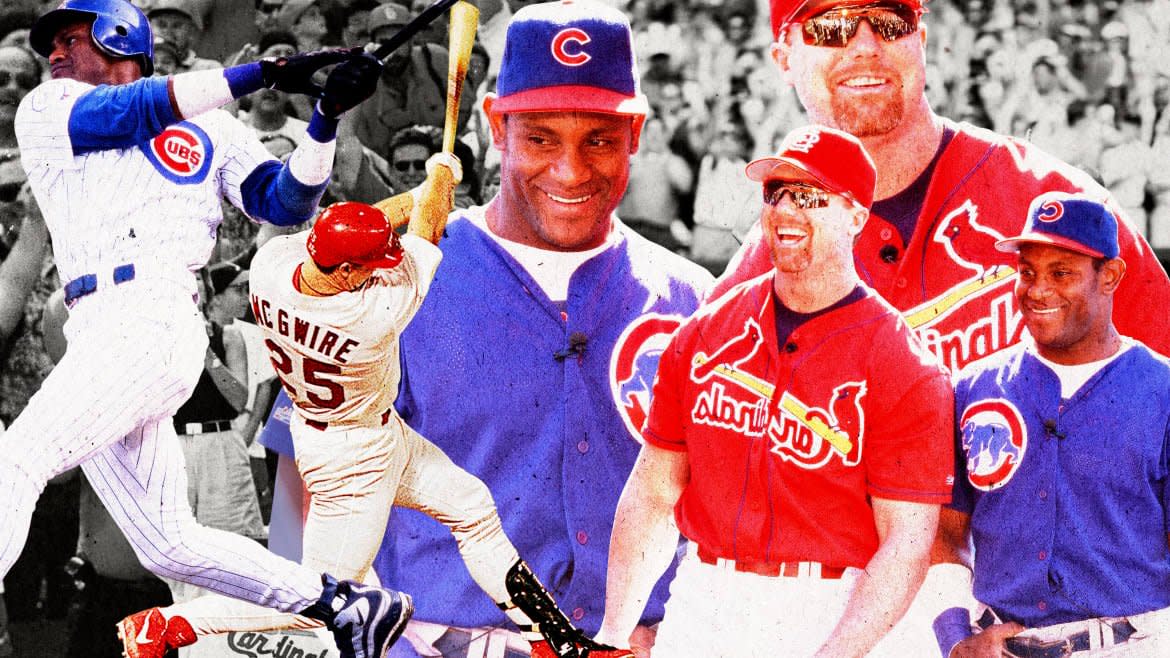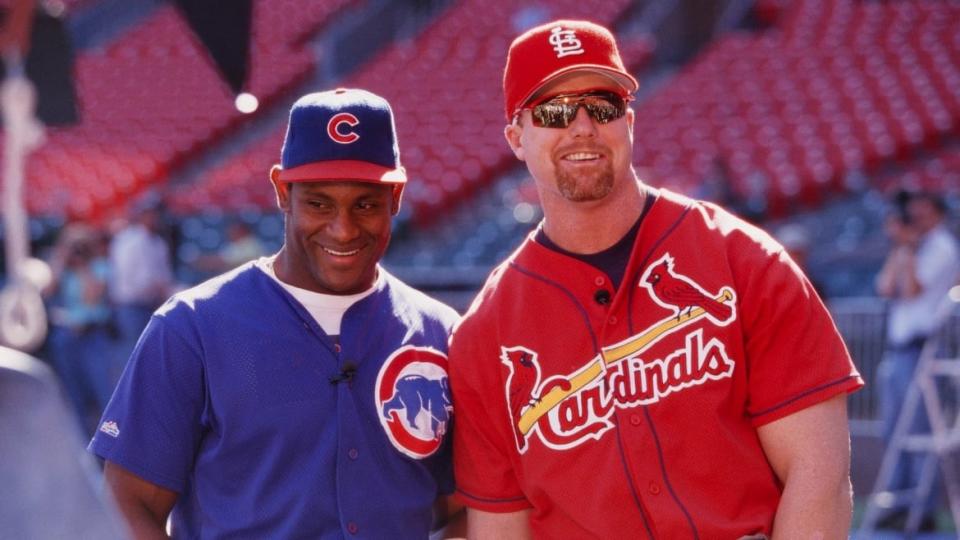When America Fell in Love With the Long Ball—and Steroids

On August 20, 1998, I spent my 22nd birthday taking in a doubleheader between the New York Mets and the visiting St. Louis Cardinals. The motivation was obvious: to get a live glimpse of Mark McGwire, the home run-bashing behemoth who was making a legitimate run at Roger Maris’ all-time single-season record of 61 dingers. McGwire didn’t disappoint, hitting one out of the park in each of the two games—#50 and #51 on the year—and electrifying the crowd in the process. It was one of the most thrilling sports experiences of my life, like watching a chapter of a larger-than-life storybook tale unfold before my eyes.
Dueling with gregarious Chicago Cubs star Sammy Sosa for the remainder of the season on his way past Babe Ruth and Maris to a historic 70 home runs, the muscular, soft-spoken McGwire came across as a real-life Paul Bunyan, and his and Sosa’s race for the record captivated a country—and fan base—at the very moment the national pastime needed it most. Suffering from dwindling popularity thanks to the catastrophic 1994-1995 strike that denied the public a World Series for the first time in almost a century, Major League Baseball was brought back from the dead by McGwire and Sosa, yin-yang personalities on storied division rivals who were both seeking athletic immortality via the most hallowed statistical achievement in domestic sports. When they finally reached—and then surpassed—their revered milestones, Americans were ecstatic that the duo had done the unthinkable, and moreover, that they’d done it the right way.
Until, of course, it turned out that the opposite was true.
Ex-MLB Commissioner Bud Selig Talks Steroids in Baseball and Cursing Out Al Gore
The Black Men Who Trained Bruce Lee for the Biggest Fight of His Life
Long Gone Summer, ESPN’s latest 30 for 30 documentary, revisits that electric 1998 season, charting the sluggers’ legendary battle through archival footage and interviews, most notably with McGwire and Sosa themselves. Yet while its title suggests wistfulness for that unforgettable, and now tainted, 1998 campaign, A.J. Schnack’s film (premiering Sunday, June 14) is largely a rousing celebration of a bygone moment in time. There’s plenty of nostalgia to be found in the network’s newest non-fiction effort. However, save for its final 15 minutes, it’s unwilling to fully grapple with the legacy of that fateful season, and the reason it, and its two central figures, have fallen so far in the public eye in the ensuing two decades.
The shroud of steroids naturally hangs over Long Gone Summer, given that reporters first noticed bottles of supplement androstenedione in McGwire’s locker in 1998. Both men were subsequently tarnished as PED abusers and appeared before Congress in 2005 (when they denied and/or evaded questions about their cheating), and McGwire confessed in 2010 to using the substances. As Bob Costas astutely opines late in Schnack’s doc, the fundamental issue with regard to such behavior had nothing to do with morality but, rather, with “authenticity.” Even in a sport with a long history of players seeking advantages through whatever means necessary, what was heartbreaking about McGwire and Sosa’s conduct was that it exposed their galvanizing feats—and the excitement generated by them—as mirages. One’s joy over their individual accomplishments, as well as one’s renewed enthusiasm for baseball, newly resurrected at the forefront of American culture, was predicated on a lie, thereby cheapening it.
In Long Gone Summer, McGwire delivers a brief, unsatisfactory comment on his steroid use: “It was only brought up to my attention that it would help through some injuries. So that’s what really the basis [was]. By no means did I need to do it for strength purposes. I don’t regret doing it. The bottom line is, if there was drug-testing back then, that would have never happened... I don’t encourage. I don’t want anybody ever to follow any footsteps like that. It just... it sort of sucked.” If, with that sentiment, the St. Louis Cardinals star effectively passes the buck onto MLB commissioner Bud Selig for not policing players like himself, Sosa fails even more miserably in addressing the topic. Pretending he doesn’t understand his chief role in the scandal—even as he proudly touts his race against McGwire—Sosa repeatedly asks why he’s been singled out by such accusations, and then refuses to admit or deny the charges, stating simply, “I’m a very happy person, my friend. I’m good, I’m happy.”
After endearing himself to fans with his outgoing personality, Sosa’s smug avoidance of copping to something everyone knows he did goes a long way toward explaining why he’s now persona non grata at Wrigley Field. Long Gone Summer, though, touches upon these PED-related strains without properly delving into them. The vast majority of its runtime is spent on a straightforward chronological account of the 1998 season, and while it captures the suspense and exhilaration of the pair’s day-to-day pursuit, it lacks the critical contextual frame demanded by this story.

Mark McGwire and Sammy Sosa in 1998
Courtesy of the controversy that followed it and, shortly thereafter, Barry Bonds’ record-shattering 2001 season (in which he hit 73 home runs), no one looks back on McGwire and Sosa’s year without also feeling melancholy about what took place. As a result, every momentous home run depicted here, greeted with insane cheers from an adoring public and elated media, elicits as much frustration as delight—a fact that director Schnack attempts, for long stretches, to skirt, instead striving to conjure a what-it-was-like-in-the-moment atmosphere free from such nagging thoughts.
For those too young to remember McGwire and Sosa’s quest for all-time long-ball supremacy, Long Gone Summer will serve as a basic primer about one of the most entertaining stories in American sports history, conveying the mythic stature of its protagonists and the magical quality of its twists and turns, peaking with McGwire breaking Maris’ record in St. Louis against the Cubs and Sosa. What’s missing, however, is a necessary sense of the overarching sorrow that’s forever stained that year, or a compelling mea culpa that might at least provide a suitable closing note for this sad saga. In its place, what we’re left with is the sight of two beloved greats who exceeded all expectations, except with regard to honesty, fairness and integrity—a disappointment that lingers long after the conclusion of their storied careers.
Get our top stories in your inbox every day. Sign up now!
Daily Beast Membership: Beast Inside goes deeper on the stories that matter to you. Learn more.

